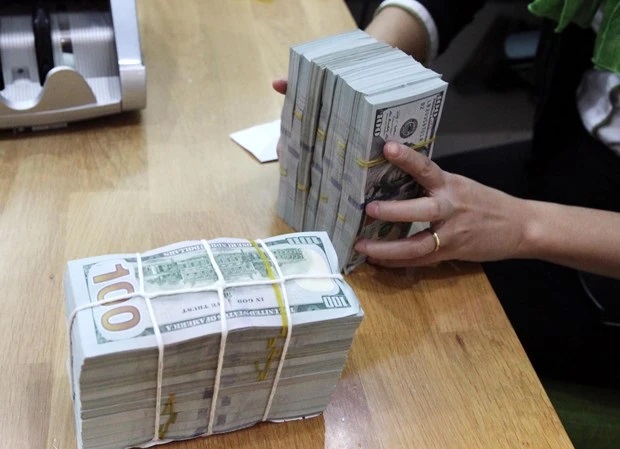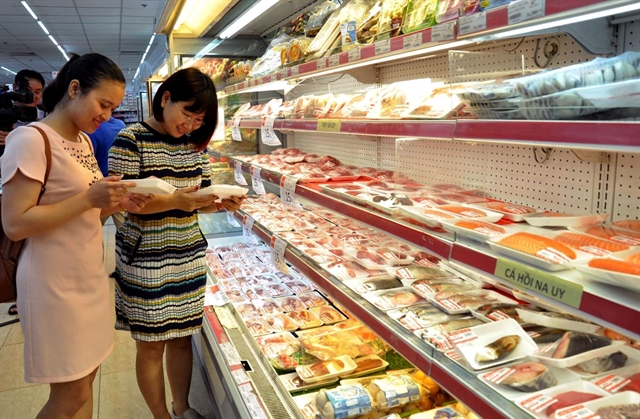 Economy
Economy

Although Viet Nam has rolled out the red carpet for enterprises and investors, conflicting legal documents remain the "nails" hindering businesses.
 |
| Workers pack biscuits at a confectionary factory in Việt Nam. SMEs need facilitation, with enhancement in their competitiveness a focus. — Photo sggp.org.vn |
HÀ NỘI — "Nails lie under the carpet."
This was what a speaker said during a seminar on the development of small- and medium-sized enterprises (SMEs) on Friday, as he described Viet Nam’s business environment.
Lê Hồng Sơn, a former director of the Ministry of Justice’s legal document testing department, said although the country has rolled out the red carpet for enterprises and investors, conflicting legal documents remain the "nails" hindering businesses.
Such conflict is seen in circulars from ministries, documents from localities, and Government regulations.
Authorities also cause difficulties for companies with certain deeds, he said.
Here are two of 21 examples Son presented on Friday, showing how inappropriate policies might cause business inequality:
Late last year, the People’s Committee of the northern province of Quảng Ninh issued Decision No 4088/2015/QĐ-UBND and Decision No 3625/QĐ-UBND, setting various conditions for tourist cruise operators on Hạ Long Bay.
One rule is that cruisers must have firefighting equipment using water built in, meaning more cisterns and pipelines are to be installed on the vessels. This can’t be done for existing ones.
While the issue remains controversial, more than 1,000 local workers face losing their jobs if the businesses are shut.
Remarkably, the decisions of the provincial authority violated enterprise, investment, tourism and fire prevention laws, as well as the law on domestic waterway traffic, and the Civil Code. The decisions would reportedly facilitate bigger firms to jump into the area.
In 2013, the Ministry of Industry and Trade issued Circular No 05/2013/TT-BCT and Circular No 59/2013/TT-BCT, stipulating that goods temporarily imported for re-export could be stored no more than 15 days, and this period could be extended by 25 days.
This conflicted with the Customs Law, which enabled a period of 12 months and an extension time of six months, for the same circumstance.
"The nails must be pulled out," Sơn said, adding that future legal documents are to be compiled with multi-sector polls and careful assessment to ensure that they do not serve "privileged groups".
Lê Văn Khương from the Ministry of Planning and Investment’s Enterprise Development Department said construction works were underway for a draft law to support SMEs.
He said the law will provide policies related to bank loans, corporate income taxes and technology, as well as production sites, public procurements and market expansion.
It will also deal with programmes to assist starts-up, form chains of companies, and help firm improve capability.
Lê Duy Bình from consultancy firm Economica said thinking has been changed about approaches to help SMEs, citing a source of the Organisation for Economic Co-operation and Development.
In the past, SMEs were considered firms that needed protection, then as those needed promotion. Now they should be the ones that need facilitation, with enhancement of their competitiveness the focus.
Prime Minister Nguyễn Xuân Phúc has insisted recently that private enterprises would be a driving force for economic growth. Special support policies were needed to foster the development of starts-up and SMEs, and to boost investor confidence.
However, participants at Friday’s meeting agreed that support programmes should not be massive, because too much assistance may work contrary to market rules and international integration commitments.
"Any policies there may be, we need a pure, healthy and equal playground for all businesses. We also need good civil servants for the sake of enterprises," said Sơn.
"It’s not how enterprises will be assisted. It’s whether a legal framework can remove business barriers that we are interested in as we wait for an SME supporting law to be available," said independent journalist Huy Duc.
Official data said Việt Nam has around 500,000 enterprises.
Khuong said nearly 98 per cent of them are SMEs, which contribute about 48 per cent to the country’s gross domestic product (GDP) and generate 50 per cent of domestic jobs. They account for only 6 per cent of the country’s foreign trade values, however.
SMEs represent 95-99 per cent of all businesses in other ASEAN countries. Nationally, they contribute 23-58 per cent to GDP, create 43-97 per cent of jobs and account for 10-30 per cent of import-export values. — VNS









.jpg)